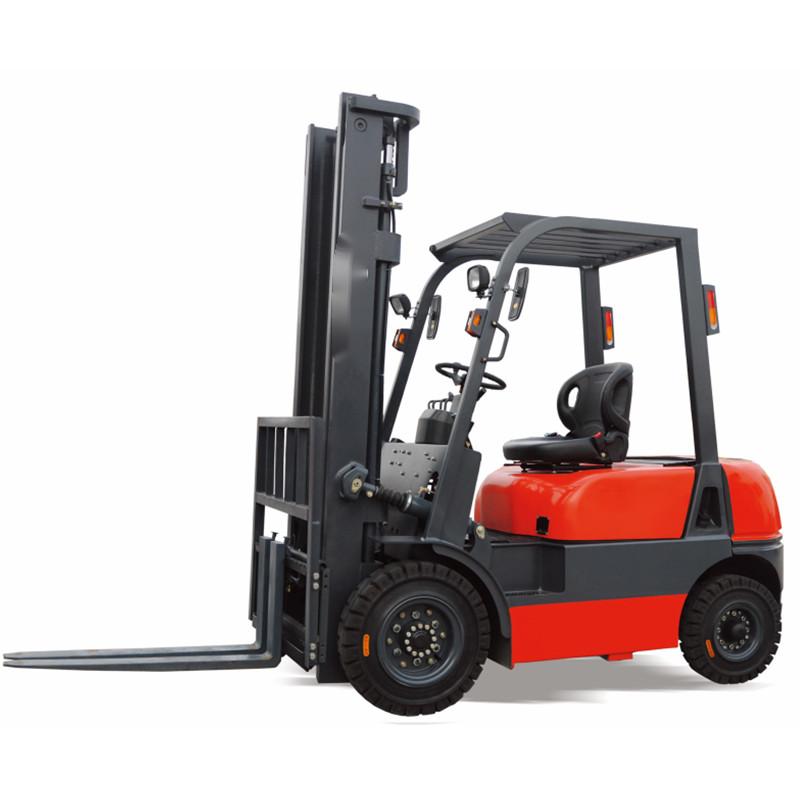The Core Value of Diesel Forklifts
The core value of diesel forklifts lies in their irreplaceable heavy-load capacity, adaptability to harsh environments, and continuous operation efficiency. Especially in outdoor and heavy-industry scenarios that are difficult for electric forklifts to cover, they can directly address the key pain points of "being unable to lift, unable to keep running, and unable to be used", providing crucial support for enterprises to ensure operational continuity and reduce site constraints.

I. Heavy-Load and Efficient Operation: Addressing the Core Need of "Being Unable to Lift"
The power characteristics of diesel forklifts make them the only choice for heavy-load scenarios, directly matching the core material handling needs of heavy industry.- Wide Range of Load Capacity: Regular models can carry 1.6-5 tons of goods, while heavy-duty models can reach a load capacity of 14 tons—far exceeding that of electric forklifts (mostly 1-5 tons). They can meet the loading and unloading needs of heavy goods such as steel, containers, and heavy construction materials.
- Strong Power Output: Diesel engines can deliver high torque even at low speeds, with a climbing capacity of 20%-30%. In terrains like ports, docks, and mine ramps, they can transport goods stably without slipping, avoiding operational interruptions caused by the "insufficient power" of electric forklifts.
- Uninterrupted Continuous Operation: Refueling takes only 5-10 minutes, and a full tank allows continuous operation for 8-12 hours—no need to reserve 6-8 hours for charging like electric forklifts. This feature makes them particularly suitable for high-turnover scenarios with "24/7 operation" such as ports and logistics hubs, directly reducing downtime losses.
II. Full-Scenario Environmental Adaptability: Breaking the Site Constraint of "Being Unable to Be Used"
The structural design of diesel forklifts enables them to adapt to harsh environments that electric forklifts cannot withstand, reducing site constraints on equipment.- Tolerance to Extreme Temperatures: By replacing with -35℃ low-freezing diesel and 5W-40 low-temperature engine oil, diesel forklifts can operate stably in the range of -20℃ to 50℃. This not only solves the problem of "20%-40% battery range attenuation" of electric forklifts in cold regions such as Northeast and Northwest China but also copes with the high-temperature challenges of outdoor operations in southern China in summer.
- Resistance to Harsh Environments: Equipped with sealed chassis and dust-proof engine design, they can be used in dusty (e.g., mines), humid (e.g., construction sites), and muddy (e.g., temporary storage yards) environments. There is no need to worry about the risks of "battery short circuits and circuit dust-related failures" of electric forklifts, which reduces the frequency of equipment maintenance.
- No Dependence on Power Grid: In scenarios without a stable power grid, such as remote mining areas and outdoor construction sites, there is no need to build additional charging piles (saving 100,000-200,000 yuan in infrastructure costs). Only diesel reserves are needed to ensure operations, breaking the site constraint of electric forklifts that "stop when there is no electricity".
III. Cost and Maintenance Advantages: Balancing the Practical Need of "Investment and Efficiency"
The advantages of diesel forklifts in initial investment and maintenance convenience can reduce enterprises’ short-term capital pressure and equipment downtime risks.- Low Initial Purchase Cost: Diesel forklifts of the same tonnage are 15%-30% cheaper than electric forklifts. For example, a 3-ton diesel forklift costs approximately 80,000-100,000 yuan, while an electric forklift of the same tonnage costs 120,000-150,000 yuan. This helps small and medium-sized enterprises with limited budgets or short-term projects (such as temporary infrastructure) reduce early capital occupation.
- High Maintenance Convenience: Diesel engines have a relatively simple structure, with extensive maintenance network coverage (service points are available in most township-level areas) and fast fault diagnosis—repairs can usually be completed within 2-4 hours. In contrast, battery and circuit faults of electric forklifts require professional technicians to handle, with a maintenance cycle often lasting 1-2 days. This advantage of diesel forklifts significantly reduces production losses caused by "equipment downtime".
- No Hidden Replacement Costs: The batteries of electric forklifts need to be replaced every 3-5 years (with a one-time cost of 30,000-80,000 yuan), while diesel forklifts have no such large hidden expenses. They only require regular replacement of engine oil and filters (with an annual maintenance cost of 12,000-25,000 yuan), making them more friendly to enterprises that use the equipment for a long time and have fixed budget plans.
IV. Adaptability Under Policy Compliance: Avoiding the Risk of "Being Eliminated"
Under the current environmental policy framework, compliant diesel forklifts still have a clear scope of use and do not need to be replaced blindly.- Compliance with Current Emission Standards: Diesel forklifts that meet China’s "National IV" and the EU’s "Stage V" standards have reduced their particulate emission limits to 0.015g/kWh through technologies such as Diesel Particulate Filters (DPF) and Diesel Oxidation Catalysts (DOC). They can be used normally in areas without "mandatory zero-emission requirements" .
- Scenario-Specific Policy Adaptability: In heavy-industry fields where the state explicitly allows "transitional use" (such as steel, energy, and ports), diesel forklifts do not need to be forced to replace with electric forklifts. This avoids unnecessary equipment update investments (with a single replacement cost of over 100,000 yuan) caused by enterprises’ "misjudgment of policies".
Conclusion
The value of diesel forklifts is not "being better than electric forklifts", but "being irreplaceable in specific scenarios". When enterprises face core needs such as "heavy loads, outdoor operations, extreme environments, and no power grid", diesel forklifts can directly make up for the capability shortcomings of electric forklifts, ensuring uninterrupted operations and controllable costs. Their essential value lies in being "the optimal solution matching scenario needs" rather than a mere "power option".



